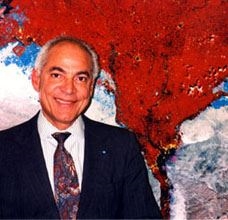 |
| Dr. Farouk El-Baz |
My hero is Dr. Farouk El-Baz. He has influenced me with his character because he used his experience to help his country, and because he loves his job. I also admire him because he worked hard until he became a very famous person who is known all over the world.
Dr Farouk El-Baz is one of Egypt's most famous men. He was born in Zagazig on January 1, 1938, and was educated at Ain Shams University and at universities in the United States. He is a space scientist and a geologist, and he has taught at Universities in Egypt, Germany and the United States. At present, he is the Director of Remote Sensing at Boston University. Using satellites, he can find underground water in deserts.
The Western Desert is one of the driest places on Earth, where it rains only once every 20 to 50 years. However, climatic conditions were very different two million years ago, when very heavy rain fell on the area. Vast supplies of water were stored under the desert sand. Radar from satellites can penetrate through dry sand to show areas of water and other deposits, such as oil and minerals. This is called remote sensing, and Dr El-Baz is the world's greatest expert in this field. From his space photographs, underground water was found in the western desert and in Sinai. He also provided the government with information on underground water supplies in the Toshka Valley.
Dr. El-Baz also worked on the Apollo Project, which landed men on the moon. From 1967 to 1973, he worked at NASA in the United States on this project. During this time, he advised the planners on the best places for astronauts to land on the moon. He taught the astronauts which rocks to collect and how to collect lunar soil. He also taught them how to take photographs on the moon.
The astronauts also set up various scientific experiments. For example, the Apollo astronauts placed instruments into holes which they had drilled into the surface of the moon. These instruments are used to measure the amount of heat escaping from the moon. This information enables Dr. El-Baz and his team of scientists to learn about the moon's early history.
Page created on 4/11/2013 5:51:48 PM
Last edited 1/9/2017 9:53:04 PM
